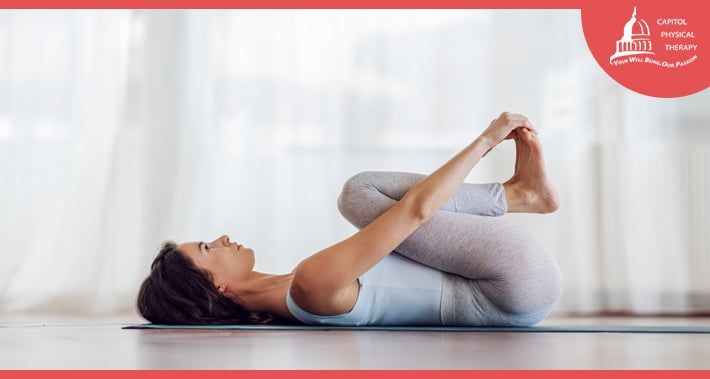
Levator ani syndrome is a common pelvic floor dysfunction which may lead to symptoms that can have a significant impact on everyday life.
Fortunately, there is help.
At Capitol Physical Therapy, we offer pelvic floor dysfunction therapy for the management of symptoms associated with levator ani syndrome.
This can include physical therapy treatments for chronic pain as well as physical therapy for urinary incontinence, for bowel issues, and sexual difficulties.
Let’s take a closer look at levator ani syndrome and how physical therapy can help.
What Is Levator Ani Syndrome?
Levator ani syndrome is a pelvic floor dysfunction that causes your pelvic floor muscles to overly tighten.
Levator ani syndrome may also be referred to as:
- Chronic anorectal pain
- Chronic proctalgia
- Levator spasm
- Pelvic tension myalgia
- Piriformis syndrome
- Puborectalis syndrome
Pelvic floor muscles help support numerous organs, such as the rectum, bladder, urethra, uterus, and vagina.
Therefore, levator ani syndrome can lead to a variety of problems, such as trouble emptying bowels, constipation, pelvic pain, painful intercourse, and erectile dysfunction.
Levator ani syndrome is more common in people assigned female at birth.
Levator Ani Syndrome Symptoms
The most common symptom of levator ani syndrome is chronic pain in the rectum caused by spasms in the levator ani muscles.
The pain may become worse when sitting down.
It is common for the pain to be worse on the left side of your body.
Additionally, lower back pain that spreads into the groins and thighs is also common with levator ani syndrome.
If you have been diagnosed with levator ani syndrome, you may also experience urinary or bowel problems as well as sexual difficulties.
Urinary or bowel problems associated with levator ani syndrome include:
- Constipation and straining to pass bowel movements
- Feeling like you haven’t completed a bowel movement
- Bloating
- Increased urination
- Difficulty beginning urination
- Urinary incontinence
Sexual difficulties associated with levator ani syndrome include:
- Pain before, during, or after intercourse
- Painful ejaculation, premature ejaculation, or erectile dysfunction
What Do Muscle Spasms From Levator Ani Syndrome Feel Like?
Spasms from levator ani syndrome can feel different for everyone.
For some, these spasms feel like a dull pain.
For others, they feel like a vibration located in the perineum, vagina, or rectum.
Levator ani muscle spasms are usually brief and last no more than 20 minutes.
What Causes Levator Ani Syndrome?
Levator ani syndrome occurs when the levator ani muscles are short, contracted, and weak.
Due to this weakness, the muscles can’t support proper blood flow to the surrounding structures and ultimately results in an inflammatory response.
The exact cause of weakened levator ani muscles is currently unknown.
Factors that may contribute to levator ani syndrome include:
- Not urinating or passing stool when needed
- Vagina shrinking (atrophy) or vulva pain (vulvodynia)
- Continuing sexual intercourse despite pain
- Pelvic floor injury due to surgery or trauma
- Other chronic pelvic conditions, including irritable bowel syndrome, endometriosis, or interstitial cystitis
How Can Physical Therapy For Levator Ani Syndrome Help?
Physical therapy is an effective solution for the management of levator ani syndrome.
Your physical therapist will teach you daily relaxation techniques that you can perform by yourself at home.
In severe cases, ultrasound trigger point injections may be used to get medications directly to the constricted muscle.
Talk with your physical therapist to determine which treatment option is right for you.

Home Exercises To Relieve Levator Ani Syndrome Discomfort
As previously mentioned, your physical therapist will provide you with at home relaxation techniques to help with symptom management.
Let’s take a look at some of these techniques in more detail.
1. Viparita Karani Pose
To begin, sit with your hips approximately 5 or 6 inches away from a wall.
Next, lay down and slowly swing your legs up so they are pressed against the wall and your heels are towards the ceiling.
Focus on your breathing and hold this position for 3 to 5 minutes.
You should repeat this pose five times a day.
2. Ananda Balasana
This one is also known as “happy baby” pose.
To begin, lay on your back on a comfortable surface, such as a bed or yoga mat.
Next, bend your knees and raise your feet upwards towards the ceiling.
Once in this position, reach to grip the outside of your ankles and gently separate your legs until they are wider than your hips.
Focus on your breathing and hold this pose for 30 seconds.
You should repeat this pose 3 to 5 times a day.
3. Balasana
You may have heard this one called child’s pose before.
To do it, kneel down on the floor, with your knees about as wide as your yoga mat if you’re using one.
From there, sit on your heels, then fold your torso overtop of them, reaching forward.
Your neck should stay in a relatively neutral position, not bending forward or back.
Because this pose doesn’t cause much strain, you can hold it for as long as you like, but 3 to 5 minutes is a good benchmark.
Book Your Appointment With Capitol Physical Therapy Today
Levator ani syndrome can interfere with your work, romantic relationships, and daily activities.
At Capitol Physical Therapy, we want to help you get back to your everyday life.
Our expert physical therapists can help manage your symptoms.
Book your appointment with Capitol Physical Therapy today to learn more.
1331 H St NW #200,
Washington, DC 20005
- https://g.page/capitolptdc
9560 Pennsylvania Ave. # 202,
Upper Marlboro, MD 20772
- https://goo.gl/maps/zjL4NnnuThRhrcS86
Capitol Physical Therapy offers orthopedic and other pain related solutions, with our versitile team of physical therapists in Washington, DC